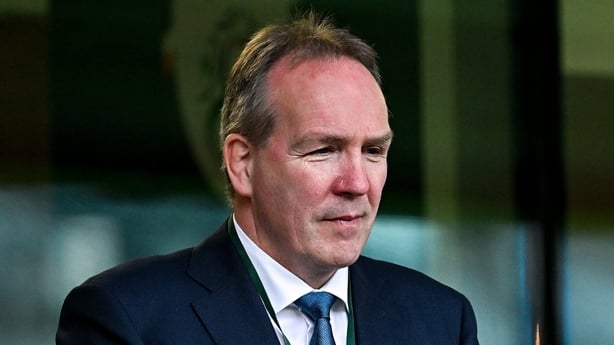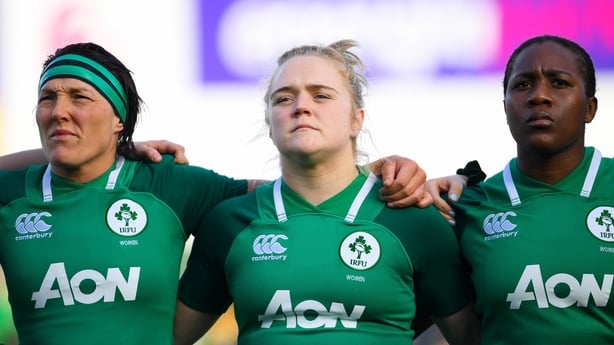The announcements this week about the future of Irish women's rugby must surely represent one of the speediest about-turns in approach and tone in the history of the game in Ireland.
Just 12 weeks ago, the IRFU was issuing patronising statements expressing disappointment that their top players were airing dirty laundry in public and casting doubt on the legitimacy of some of the issues they were raising.
Today the IRFU’s chief executive formally apologised to those same players and agreed to implement significant proposals that will begin a new era for the women’s game in Ireland.
The arrival of Kevin Potts has clearly had a huge impact, and while no one expected or asked for an apology, it seems designed to a represent a line in the sand moment from an era in which many players had lost all faith in their own union, to one in which women and girls will feel a fully valued part of the game.
For that alone, the apology and Potts’ approach should be welcomed.
Anyone who doubted the legitimacy of the challenges the players set out in their letter last year should be silenced by reading the recommendations published today.
There is nothing ground-breaking about the 30 proposals. They are solid and sensible. And that is exactly the point.
That Amanda Bennett and her team felt the need to recommend that the IRFU introduces a robust selection policy, a performance plan and a culture of consultation, to give just a few examples, tells us a lot about how the national women’s programme was being run.
These are after all, policies that would be considered basic amongst even many grassroots clubs.
To that end, the recommendations also go rather a long way in explaining, in part, the Irish team’s underperformance in recent years.

Their implementation should make a significant difference, if only because many of the suggested structures and processes should be part and parcel of a high-performance environment that is designed to get the absolute best out of its players.
They may also make emotional reading for the many Irish players whose recent careers have ended in disappointment, or those still involved who will be watching at home when the World Cup is on later this year.
How much more likely would qualification have been if the system around them was better run? They will never know, and some will never get another chance.
Undoubtedly though, what has been announced is vitally important, with the change of tone alone enough to make even the most hardened cynic hopeful.
It is however only the first step on a long-term journey of change.
The second relates to another ongoing review, and arguably a more important one as it is looking at the overall game across the country.
There are commitments today about that process being equally robust with players heavily involved and there seems to be an implicit promise too that Potts will have overall oversight of the delivery of both sets of plans.
With the external challenges addressed, he will then have to work out how to genuinely oversee a cultural change within his own organisation, not just amongst his employees but also within the powerful committees which have such an influence in how the game is run in Ireland.
Of all the challenges, this is possibly the toughest.
Because while changes to systems and processes will always help to deliver some immediate benefits, on their own they are never going to be enough to make lasting progress when it comes to issues like fairness and gender equality.
It’s important to remember that the players’ letter last year spoke not just to the challenges of the national programme, but also to issues like attitudes, governance, and the instinct of those running rugby across the country.
There are still far too many people within and around the IRFU who privately sneer about the women’s game, who do not see it as the growth opportunity it undoubtedly represents and who hate how this group of players have publicly gone about their business.
Potts has to find a way to ensure that those people are not a block on progress and work to embed a culture that more instinctively values women and girls and genuinely wants them as an integral part of the game – whether as players, volunteers, referees, coaches or senior executives.
Unwinding a culture in an organisation where the ingrained knee-jerk reaction is always to prioritise men – and more recently women’s sevens over 15s - will take time, but if Potts and his senior team can crack this, then I’d argue it will do far more for the game in the long run than any investment made today.

Finally, it’s important to put on record the vital role that Ciara Griffin, Cliodhna Moloney, Lindsay Peat and Claire Molloy have played in this process and to applaud them for their efforts so far.
In spearheading the writing of the letter that kicked this all off last year, they put themselves in a spotlight many others have perhaps understandably ducked as the problems behind the scenes mounted in recent years.
With attempting to make change from within getting the players nowhere, someone had to step up and these four have done it.
Being thrust into negotiations and discussions with Sport Ireland, Ministers and the IRFU, while also keeping the rest of the players updated and managing significant media interest will not have been easy, especially given they all have day jobs and training commitments.
Though the work is not yet done, they have helped to lay foundations for a new era in Irish women’s rugby.
For all their collective achievements on the field, it is hard to think of a better legacy for any of them to leave behind when their playing days are over.
Listen to the RTÉ Rugby podcast on Apple Podcasts, Soundcloud, Spotify or wherever you get your podcasts.
Follow all of Ireland's Six Nations games via our live blogs on rte.ie/sport and on the RTÉ News App or listen to live radio coverage on RTÉ Radio 1. Watch live coverage of England v Ireland on Saturday 12 March (4.45pm) on RTÉ2 and RTÉ Player.
Also, see live URC action this week with Ulster v Cardiff (Friday 4 March, 7pm) and Benetton v Leinster (Saturday 5 March, 12.30pm) live on RTÉ2 and RTÉ Player.

